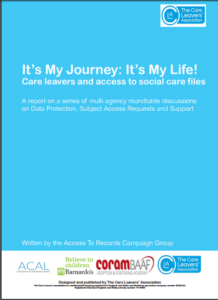Guest Post
Victoria Hoyle
Research associate, University College London
Greetings from across the pond! I’m Victoria Hoyle, a research associate at University College London and am glad to have been invited to write a guest post about our current work on information rights in child social care records. MIRRA – which stands for Memory – Identity – Rights in Records – Access – is a two year participatory action research project led by Professor Elizabeth Shepherd and funded by the Arts and Humanities Research Council. It brings together care leavers and researchers from UCL to explore social care recordkeeping in England from 1970 to the present, focusing particularly on access to records for people who have experienced out of home care.
 The project was galvanised by a 2016 report from the Care Leaver’s Association, It’s My Journey, It’s My Life: Care leavers and access to social care files (Click to download the pdf). This set out the many challenges and barriers that English care leavers face in gaining access to their records within the current legislative framework. Unlike adopted adults who have specific rights to information and support under UK law, care leavers must make generic ‘Subject Access Requests’ under Data Protection legislation. These are handled inconsistently across the country and the process is complicated by a lack of knowledge about what records should be kept and what can be disclosed. The issues that arise as a result are sadly familiar to many. Lost or fragmented files, long delays in receiving a response, heavily redacted documents and a lack of contextual knowledge about care provision are common to experiences in both England and Australia.
The project was galvanised by a 2016 report from the Care Leaver’s Association, It’s My Journey, It’s My Life: Care leavers and access to social care files (Click to download the pdf). This set out the many challenges and barriers that English care leavers face in gaining access to their records within the current legislative framework. Unlike adopted adults who have specific rights to information and support under UK law, care leavers must make generic ‘Subject Access Requests’ under Data Protection legislation. These are handled inconsistently across the country and the process is complicated by a lack of knowledge about what records should be kept and what can be disclosed. The issues that arise as a result are sadly familiar to many. Lost or fragmented files, long delays in receiving a response, heavily redacted documents and a lack of contextual knowledge about care provision are common to experiences in both England and Australia.
I don’t need to make the case for the value of these records or the importance of good recordkeeping, or explain the devastating impact of poor practice on people’s lives. The work that has been done in Australia in advocating for improved systems and culture of access, and for the rights of care experienced people to their histories and identities, has been both a model and an inspiration to MIRRA. Our aim is to build a similar evidence base that can be used to raise awareness of the life-long impact of recordkeeping with policy makers, social care practitioners and information professionals.
We’re not breaking entirely new ground. There has been some research in this area in the UK already. Gill Pugh worked with a small number of people who had requested their Barnardo’s records in the late 1990s, while Derek Kirton investigated the experience of adult care leavers who accessed their records at The Children’s Society in the early 2000s. Jim Goddard and colleagues (2008, 2013) have considered the experience of people who have accessed records of local government care. Most recently IICSA, the Independent Inquiry into Child Sexual Abuse has observed the importance of records in both its interim report and its recommendations following the investigation into Child Migration Programmes (click to download pdf). However, the Care Leavers Association research shows that the complexities of social care recordkeeping and the nuances of care experienced people’s rights to information continue to be poorly understood in practice in England.
It’s this poor understanding that we hope to change, by taking a recordkeeping perspective that is attentive to the ways in which records are created, managed, preserved and theorised throughout their existence. Through interviews and workshops we are collecting qualitative data from four participant groups: care experienced adults, who are the subjects of the records; social care practitioners, who create records; information professionals, who manage and often provide access to records; and academic researchers who use social care records in their work. By taking a holistic view from multiple perspectives, and by considering recordkeeping from the point of creation through to access and disposal, MIRRA hopes to generate nuanced accounts of information rights and information responsibilities in social care records.
Using the data we will create a range of resources to support care leavers to exercise their rights on the one hand, and social care providers and information practitioners to fulfil their responsibilities on the other. A policy brief for government will raise the profile of recordkeeping challenges, seeking to clarify and consolidate existing regulation. The disparity in treatment and lack of engagement with the long term psychological and emotional welfare of care leavers speaks to a deep discrimination that is enabled by the legislative frameworks in which the records sit. Our ultimate aim is to instigate a shift in this legislative environment, towards a framework that recognises the unique nature of the relationship between social care records and care leavers.
You can meet the other members of the research team, find out more about the project and follow our progress via our blog: http://blogs.ucl.ac.uk/mirra/ or on Twitter @MirraProject. If you have any questions or suggestions you can contact me directly: v.hoyle@ucl.ac.uk.
